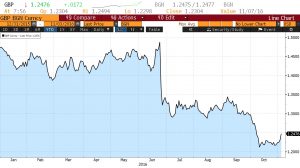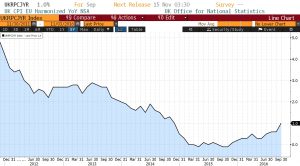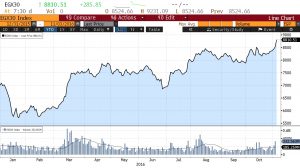Daily Comment (November 3, 2016)
by Bill O’Grady, Kaisa Stucke, and Thomas Wash
[Posted: 9:30 AM EDT] First, we would like to congratulate the Chicago Cubs on ending their 108-year championship drought.
A panel of London judges decided overnight that the U.K. must hold a Parliamentary vote before triggering Article 50 of the Lisbon Treaty to start the two-year process to withdraw from the EU. The ruling hinged on the fact that Brexit would lead to a change in domestic law without Parliament’s approval. The final court ruling will come from the country’s Supreme Court next month. This complicates PM May’s intent to unilaterally start Brexit by March of next year. As shown in the chart below, the pound rose on the news as investors await PM May’s response on whether she will have to alter her Brexit plan. It is likely that the debate will move to the Parliament for a vote, but May had indicated earlier that enough MPs support triggering Article 50 that she believes the vote would pass in favor of the measure.

Separately, the Bank of England also released its rate decision. The bank maintained rates at 0.25%, as expected, after lowering them in August on speculation that the Brexit vote would adversely affect the country’s growth. The Monetary Policy Committee (MPC) projections now forecast higher inflation, with the CPI rising to 2.0% early next year and 2.5% by 2019. The chart below shows the annual change in the U.K.’s headline CPI, which rose to 1.0% in September from 0.6% the year before.

Interestingly, the MPC removed language from its communication signaling another possible rate hike this year. In fact, the bank said that there are “limits to the extent to which above-target inflation can be tolerated,” implying that it could move its benchmark interest rate in either direction based on economic conditions. The committee also revised its short-term growth rate higher, while revising the long-term growth rate lower. The bank is concerned about the inflationary pressures on household spending and political uncertainty surrounding Brexit. Volatility is likely to remain elevated leading up to the Supreme Court ruling, ensuing Parliamentary vote and Brexit negotiations.
The Egyptian central bank said that it would allow the country’s currency, the pound, to float in response to a persistent dollar shortage, which has depressed economic growth. The country will end exchange rate controls and hike interest rates. The country has a dual objective in ending exchange controls. First, it is hoping to attract foreign capital flows back into the country. Political uncertainty following a series of uprisings had alarmed investors, who pulled funds out of the region. We note that capital controls for foreign investors remain in place. Second, the policy change could help the country secure an IMF loan.
The Egyptian equity market rose, shown in the chart below. Additionally, Egypt’s bond yields fell.



